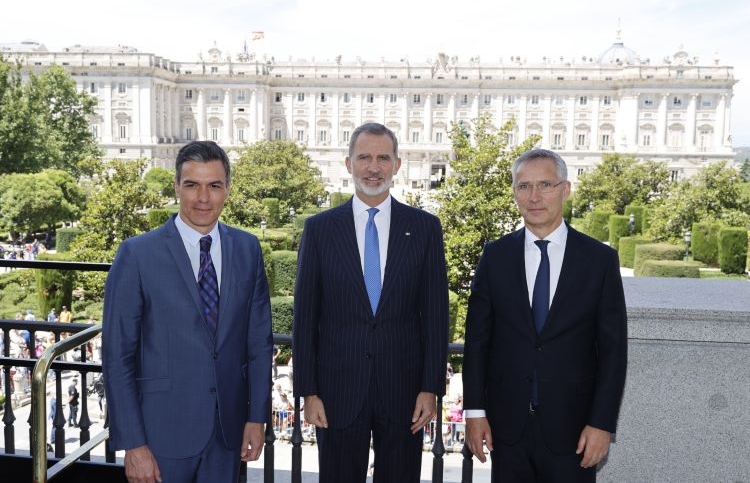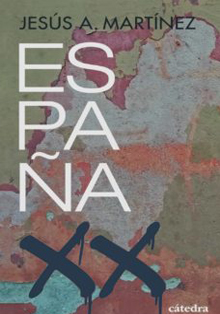The Diplomat
King Philip VI, the President of the Government, Pedro Sánchez, and the Secretary General of NATO, Jeans Stoltenberg, participated yesterday at the Royal Theater in Madrid in the commemorative acts of the 40th Anniversary of Spain’s accession to the Atlantic Alliance, which were not attended by the ministers of Unidas Podemos.
The event was attended by several former secretaries general of the Alliance (including the Spanish Javier Solana), former presidents of the Government of Spain, ministers, representatives of high State institutions, the Ukrainian ambassador to Spain, Serhii Pohoreltsev, and Ihor Zhovkva, diplomatic adviser to President Volodymir Zelenski. The event was also attended by the members of the NATO Atlantic Council, composed of the permanent representative ambassadors of the allied countries in Brussels.
Those who were not present were the ministers of Unidas Podemos within the coalition government of Pedro Sánchez. In statements to TVE, the Minister of Foreign Affairs, José Manuel Albares, avoided pronouncing on that absence. “I have not spoken to them,” he declared. In any case, he assured, the Council of Ministers has shown, “Tuesday to Tuesday”, that it agrees “that peace has to return to Ukraine as soon as possible”.
In this regard, the spokesman of Podemos, Javier Sánchez Serna, declared yesterday at a press conference that his party does not support the commemoration or the Madrid Summit in line with its opposition to sending arms to Ukraine and the increase in military spending, and because it considers that this type of act does not contribute to bringing the “long-awaited peace”. For her part, the federal spokesperson of IU, Sira Rego, affirmed that the absence at the event is “more than justified” because NATO is an “instrument for war”. The second vice-president, Yolanda Díaz, was invited to the event, but did not attend because she had a medical appointment, according to sources in her entourage informed Europa Press.
The event began with some words by Pedro Sánchez, in which he stated that NATO and the EU are facing possibly the “greatest challenge in their history” because of the Russian invasion of Ukraine, in the face of which, “from the beginning it has been very clear that unity and cohesion among allies is NATO’s best weapon of deterrence to prevent an escalation of the conflict.”
“It is imperative that we strengthen our deterrence capability, which requires modern military capabilities that can only be acquired through high defense spending,” because “there is no higher cost than facing armed conflicts and the terrible instability they generate,” he warned. Sánchez also referred to the next NATO Summit, which will take place in Madrid on June 29 and 30, which comes at “a key moment after Russia’s invasion of Ukraine” and in which, in addition to the approval of the new Strategic Concept, the candidacies of Sweden and Finland, two “consolidated democracies” whose contribution to the Atlantic Alliance “will be of enormous value”, will be addressed.
Stoltenberg: “Spain provides fundamental support to Ukraine”
For his part, Jens Stoltenberg assured that, “during the last four decades, Spain has contributed enormously to the Alliance”, playing “a fundamental role in NATO missions and operations”. In that regard, he stressed, “in the response to Russia’s brutal and unprovoked war in Ukraine, Spain is playing an important role in strengthening our deterrence and defense, deploying additional troops, ships and aircraft to reinforce NATO’s defense of Europe” and providing “critical support to Ukraine with security assistance and humanitarian aid to uphold Ukraine’s right of self-defense enshrined in the United Nations Charter.”
“Next month, Madrid will host another historic summit” that will coincide with “the war of aggression being waged by Russia against Ukraine” and at which “we will chart the way forward for the next decade, readjust our deterrence and defense for a more dangerous world, and intensify our cooperation with like-minded countries and organizations, such as the European Union and the Indo-Pacific countries,” he said. “We will also be joined by Finland and Sweden, which have just submitted historic applications to join our Alliance,” he continued.
Prior to the event, Pedro Sánchez and Jens Stoltenberg held several meetings over the weekend and yesterday to address preparations for the upcoming NATO Summit and to discuss the membership applications of Sweden and Finland, which have the support of Spain and will attend the Summit at the invitation of the Spanish Government.
Philip VI stresses the importance of the Eastern and Southern flanks of NATO
The event was closed by the King, who admitted that, “unfortunately, the circumstances surrounding this anniversary are not those we would have wished for.” “The unacceptable Russian aggression against Ukraine reminds us, and does so tragically, of the enormous value in our lives of peace, security and democracy,” he continued. “In such circumstances, we are united in our support for Ukraine, because what is at risk is not only its sovereignty and territorial integrity, but hundreds of thousands of innocent lives, the peace of the entire European continent and, by extension, the rules-based international order that we all contributed to build over the past decades,” he stated.
“In a month’s time Madrid will once again host a NATO Summit, exactly 25 years after the one that took place in 1997 and which, for the first time since the end of the Cold War, opened the doors to new members,” the King recalled. “The accession, two years later, of the Czech Republic, Hungary and Poland pointed the direction for a successful enlargement that has brought us to today’s community of 30 allies. Now, the war in Ukraine makes us unite around our values and NATO must recover that same spirit of 25 years ago,” he said.
“Spain fully shares, and at this very moment even more so, the crucial importance of maintaining a solid deterrence and defense on our eastern flank,” but “our collective security also requires the Alliance to pay increasing attention to the challenges of the strategic direction South, where terrorism of jihadist matrix directly threatens our societies and, moreover, where other actors – state and non-state – who do not share the values present in the Charter of the United Nations, try to do so indirectly,” warned Philip VI. The event concluded with an honorary concert, after which the King and Queen offered a private lunch to all the guests at the Royal Palace.
Spain became the 16th member of the North Atlantic Treaty Organization on May 30, 1982, during Leopoldo Calvo Sotelo’s term as Prime Minister. After a period of reflection opened with the victory of Felipe González (PSOE) in the elections of October of that year, membership of the Alliance was ratified by referendum on March 12, 1986. For several years, Spain participated in all areas of NATO’s work, except for the integrated military structure. On November 14, 1996 (during José María Aznar’s term of office), the Congress of Deputies authorized the Government to negotiate Spain’s entry into the new NATO command structure.
On July 8 and 9, 1997, Spain hosted for the first time the NATO Summit in Madrid, which concluded with a communiqué stating Spain’s aspiration to participate “fully” in the integrated military structure. Full membership finally took place in 1999. Therefore, the next NATO Summit in Madrid, which will take place on June 29-30, is the second to be held in Spain.







